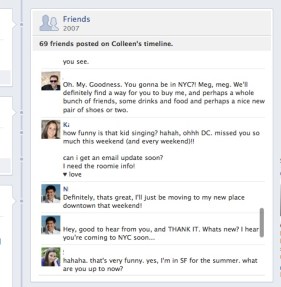| |||||||||||||||||||||||||||||||||
|
MAIN MENU MOVED TO THE BOTTOM OF THE BLOG!
Search This Blog
Friday, December 14, 2012
The new YouTube app for iPad
From : The YouTube Team
Monday, December 3, 2012
Social media analyst: Internet censorship is a grave concern
Published on 2 Dec 2012 by AlJazeeraEnglish : The International Telecommunications Union (ITU), an agency of the United Nations responsible for international information and communication technologies regulations, is set to meet in Dubai to revise regulations for the first time since 1988.
In an interview with Al Jazeera, Thomas Crampton, the Asia Pacific director of social media at the communications firm Ogilvy and Mather, says much is at stake in the negotiations.
Thursday, November 15, 2012
Socware
Protecting yourself from Facebook malware
Published on Nov 13, 2012 by CNETTV : Forget e-mail spam -- that's old school. Now there are spammy messages propagating through your social networks. CNET's Sumi Das has more details on how to prevent yourself from falling victim to socware.
Monday, October 29, 2012
Windows 8: Is It Worth The Upgrade?
Windows 8 has been at the forefront of discussion for the weeks leading up to its launch on Friday. The company says that Windows 8 is the future – a world where traditional desktop computing and touch computing can live in harmony. A future where all your content is at your fingertips at all times. So is the future worth it?
more from source >>Thursday, October 25, 2012
Internet & 'muslims' cupid service!
Published on Oct 24, 2012 by ummahfilms : The reality is that Muslim Single events that use the speed dating process just don't work. Half Our Deen takes a revolutionary approach at helping Muslim get married. Instead of playing a game of musical chairs like other events, HOD Offline uses a series of activities to allow it's participants to learn about each other in a deeper way. The results speak for themselves.
Saturday, October 13, 2012
U.S. thinks Iran behind cyberattack in Saudi Arabia
 Panetta referred to the “shamoon” virus for the first time publicly, saying it erased critical files on about 30,000 computers at Saudi Aramco, the world’s largest oil company.
Panetta referred to the “shamoon” virus for the first time publicly, saying it erased critical files on about 30,000 computers at Saudi Aramco, the world’s largest oil company.
The United States believes Iran was behind a major cyberattack on Saudi Arabia’s state oil company and a Qatari gas firm, a former U.S. official who has worked on cybersecurity issues said Friday.
In a major cybersecurity speech on Thursday, Defense Secretary Leon Panetta issued a veiled warning to Tehran that Washington is ready to take preemptive action to protect U.S. computer networks, the former official said.
U.S. government agencies have concluded that Iran orchestrated the “shamoon” virus that disabled tens of thousands of computers at Saudi Aramco and struck Qatari natural gas firm RasGas as well, said James Lewis, who has worked for the State Department and other government agencies on national security and cyber issues.
American officials had “more than a suspicion” that Iran was to blame for the August attacks, that also possibly included recent denial of service attacks on some U.S. banks, said Lewis, a senior fellow at the Center for Strategic and International Studies think tank.
“There’s generally a conviction that it was Iran,” he told AFP.
more from original here | 13 Oct 2012 >>>>
Scary Facebook setting you have to change now!
 Privacy concerns just never seem to end on Facebook. Earlier this week, a security researcher found what seemed to be a glaring flaw in Facebook's security. In many cases, it could allow a total stranger to find you and your mobile phone number.
Privacy concerns just never seem to end on Facebook. Earlier this week, a security researcher found what seemed to be a glaring flaw in Facebook's security. In many cases, it could allow a total stranger to find you and your mobile phone number.
All the person has to do is search for any mobile number using the site's mobile search function. If you have your number on Facebook - or have the Facebook app on your phone - your name will pop up.
When the security researcher went public with this information, Facebook said it's a feature, not a bug. That means it probably won't be fixed. Though Facebook might not care about your privacy, I do. So, I'm going to tell you how to stop it.
The problem lies with a simple privacy setting. By default, Facebook allows anyone to search for your profile by your mobile number. You can change this so strangers can't look you up.
Click the upside-down triangle in the right corner of your profile. Go to Privacy settings and then How You Connect. Set "Who can look you up using the email address or phone number you provided?" to Friends.
You can remove your phone number from Facebook as well. However, this prevents you from using two-factor authentication on your Facebook account, which I do recommend. Plus, if you use the Facebook mobile app, your number is permanently attached to your account.
more from original source >>>
more from original source >>>
Friday, October 12, 2012
Be Prepared for Ransomware Virus!
Oct 11, 2012 : After historic Internet protests in January the SOPA anti-piracy bill was defeated. However, this week several reports have pointed to a rather unfortunate SOPA comeback. Not in Congress, but as a nasty cryptovirus that locks up people’s computers and accuses them of distributing copyright infringing files. Infected users can get their data back after a payment of $200 – at least, that’s what the virus makers promise.
The Stop Online Piracy ACT (SOPA) was a major threat to the Internet. The bill introduced draconian censorship tools for the Government and copyright holders, that worried the public and many key Internet companies including Reddit, Google and Wikipedia.
After months of protest, the bill was eventually killed off following the Internet Blackoutearlier this year.
But that doesn’t mean SOPA is no longer a threat. This week ‘the bill’ was resurrected by a virus maker, who has been warning users of infected computers that their IP-address is on a blacklist after it was discovered distributing illegal content.
SOPA Ransomware
As a result, the SOPA virus holds all files on the host computer ransom.
“Your computer is locked!” the splash screen above warns, adding:
more from source >>>
Tuesday, October 2, 2012
New Android virus could wipe out all of user's information
WASHINGTON | 1 Oct 2012 -- A security researcher says cell phones equipped with Google’s Android operating system are at risk of being disabled or wiped clean of their data, including contacts, music, and photos.
Opening a link to a web site or application embedded with malicious code can trigger an attack capable of destroying the memory card in Android-equipped handsets made by Samsung, HTC, Motorola and Sony Ericsson. That from Ravi Borgaonkar (BOR-gahn-car) of Germany’s Technical University Berlin. He wrote that another code that can erase a user’s data appears to target only the top selling Galaxy S III and other Samsung phones.
Borgaonkar says he informed Google of the vulnerability in June. A fix was issued quickly, he says, but it wasn’t publicized, leaving manyphone owners unaware the problem existed.
source here >>>
Monday, October 1, 2012
Old Facebook posts haunt users - how to deal with it?
Published on Sep 26, 2012 by CNETTV : CNET's Sumi Das talks to reporter Donna Tam about the privacy fears Facebook users are experiencing as the social network continues the worldwide rollout of its Timeline feature.
Monday, September 24, 2012
Facebook tests prompt asking you to snitch on your friends who aren’t using their real name.

Facebook’s ongoing war on pseudonyms is well-documented. The company wants everyone to use their real name on the social network, and ideally this would be their only identity on the Internet. Menlo Park often bans users that use fake names (most are spammers, but many are just using pseudonyms), but it recently went further than that: the company is now asking you to snitch on your friends if they are not using their real name.
As you can see in the screenshot above, courtesy of Twitter user chapeaudefee (viaTPM), Facebook recently started prompting friends of users with names they suspect to be fake. Facebook confirmed the prompt with The Next Web today:
source here >>We are always looking to gauge how people use Facebook and represent themselves to better design our product and systems. We are showing people information that their friends have made available to them and we indicate to the person taking the survey that their response will be anonymous to ensure them that we are not sharing their data with anyone and only looking to understand the results in an aggregate sense. Additionally, it is important to understand that we will not be using this data for enforcement actions.
Better check your facebook timeline!
Updated. Some Facebook users are seeing private messages written in 2009 and earlier showing up on viewable Timelines as messages “Posted by friends.”
We first heard reports of this through emails from readers. Anecdotally, this appears to be true, at least for me — I am currently seeing what appear to have been private messages on friends’ Timelines. My own Timeline also now is showing pre-2009 direct messages. Not all users, however, are seeing the bug.
The issue appears to be showing up both here in the United States as well as internationally. Reports of this have been been published in French newspapers such as Le Monde, Le Matin andMetro France.
This is just breaking, so this post will be updated as more information becomes available. We’ve reached out to Facebook for comment, and will update this with any feedback we receive.
Update: A Facebook spokesperson responded via email with the following message:
original report here >>“A small number of users raised concerns after what they mistakenly believed to be private messages appeared on their Timeline. Our engineers investigated these reports and found that the messages were older wall posts that had always been visible on the users’ profile pages. Facebook is satisfied that there has been no breach of user privacy.”
US Tech Stocks all down except google!
Facebook, Apple highlight tech retreat
Google edges higher after Citigroup ups its price target to $850
SAN FRANCISCO (MarketWatch) — Declining shares of Facebook Inc. and Apple Inc. highlight an early tech sector retreat on Monday, even as a Google Inc. got a lift from an upbeat Citigroup review.
Facebook FB -9.10% fell 7% to $21.27 on a Barron’s analysis arguing that the stock is worth just $15.
In tech, content is king
In the war over technology platforms, content is a potent weapon. Companies like Netflix, Pandora and Yelp risk getting squeezed in the middle.
Apple AAPL -1.77% was down about 1.3% after the company announced that it has sold 5 million iPhone 5s since the smartphone went on sale three days ago. The number was below what some analysts had projected. See story on iPhone 5 sales.
Meanwhile, Google GOOG +1.83% bucked the downward trend, rising 1% to $740.85 after Citigroup analyst Mark Mahaney raised his price target to $850.
“We’re now back at the peak. And we believe Google shares can rise materially higher over the next 12 months,” Mahaney wrote. He argued that key hurdles for the stock are “abating,” including worries about the impact of its acquisition of Motorola Mobility and stiffer competition from Facebook.
source here >>>
source here >>>
Facebook Starts Letting You View And Delete Your Facebook Search History

Even though search history on search engines like Google is totally private, some people still enjoy the ability to delete it. Now Facebook is following suit, allowing you to view and delete all or part of your search history through the profile Activity Log. The new feature will give you more transparency into what you do on Facebook, what it tracks, and make you feel like you’re more in control. The feature begins rolling out today and will reach everyone over the next several weeks.
The change could signal that Facebook wants to get deeper into web search, and is prepping for a release by adding new controls.

To see your search history, go to your profile, click the Activity Log on the right side, click the “All” drop down and you’ll be able to select to view your “Search” history in reverse chronological order. From there you can click through to re-search things you’ve looked for in the past, delete specific searches, or clear your entire history.
source here | 21 Sept 2012 >>>
source here | 21 Sept 2012 >>>
Friday, September 21, 2012
How to Know If Your Facebook Page Was Hacked.
Currently, Facebook is the second most popular website on the Internet. As such, it is a prime target for hackers. The Facebook accounts of unsuspecting victims are routinely hacked, usually to be used for phishing scams and advertisements. If you think that your Facebook account is impervious to hacking, think again. Clicking on certain links or having a weak password could mean you see some of the trademark signs of a hacked Facebook account.
Instructions
- 1Log into your Facebook account and choose "Account" from the upper right-hand corner. Select "Account Settings" from the drop-down menu and locate "Account Security." Expand the section and choose to receive notifications. This increases the security level for your Facebook account by setting your account so that when it is accessed from a computer or device it has never been accessed from before, Facebook notifies you immediately by email.
- 2Test your password frequently. If your account has been hacked, the hacker usually changes the account to delay your access. If the password you use suddenly stops working, use the Facebook "forgot your password" link on the login page to reset your password. When you set your password, ensure that you use both letters and numbers to make it harder to guess.3 Look through your past Facebook activity, which is documented on your wall. If you see unfamiliar pictures, websites and videos posted, your Facebook account may be being used for phishing schemes to lure your friends and family members into clicking links because it appears that you've recommended them.
- 4Ask your friends and family members to watch your profile for suspicious activity. They can notify you if a hacker has been posting items and links from your profile.
- 5Watch your email for the security message that Facebook sends when suspicious activity is detected. If suspicious links and spam appear in your profile, Facebook sends a security message to the email address affiliated with your account. Your account is temporarily suspended until you can go through the process of resetting your password to reinstate access.
- 1
Subscribe to:
Comments (Atom)
Cloud Computing Plain and Simple |
Computer Software in Plain English |
World Wide Web in Plain English |
MAIN MENU
 _PERWI.ORG
_PERWI.ORG 













